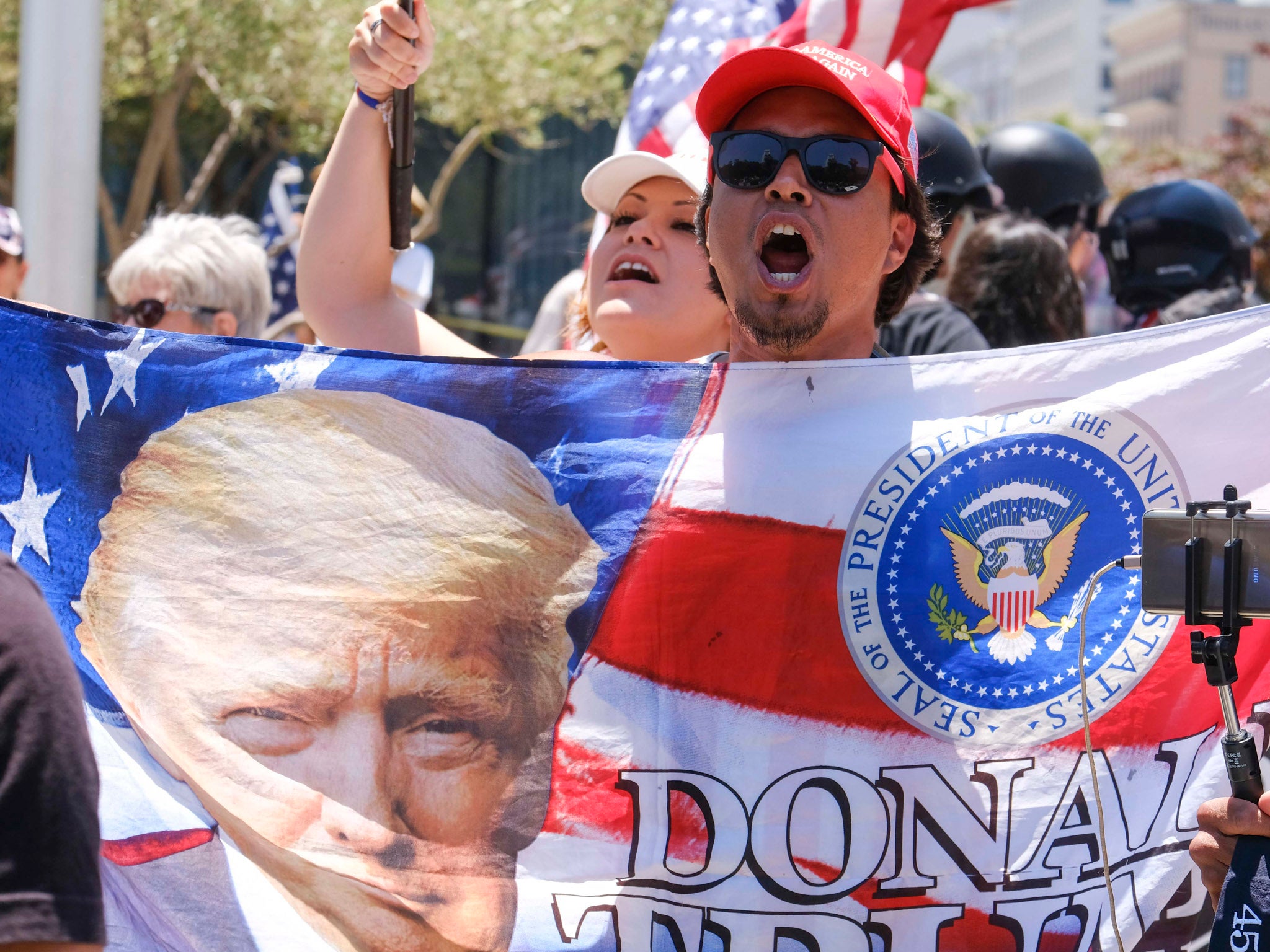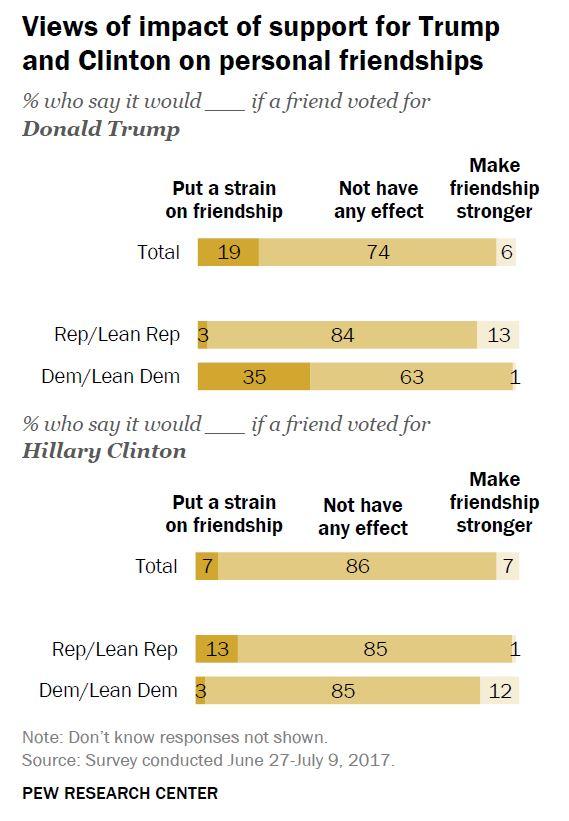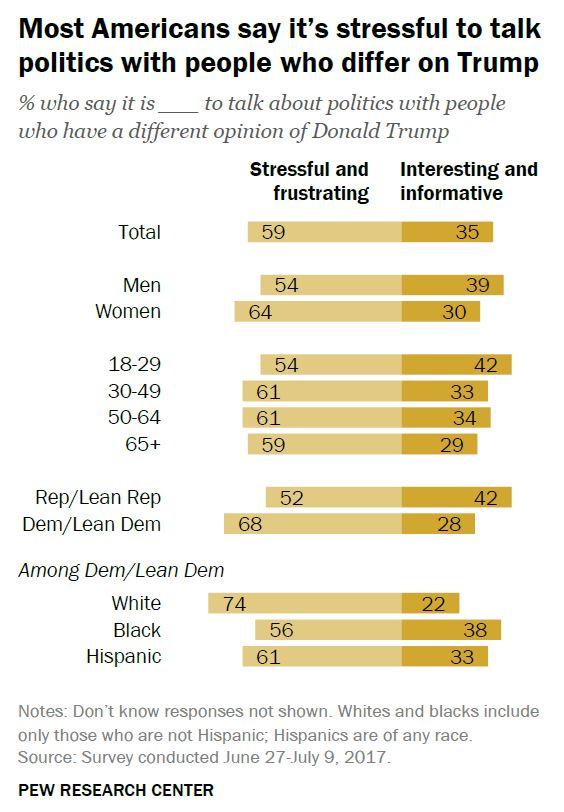Nearly half of US liberals don't want to be in the same room as Trump supporters, finds survey
Poll shows 47 per cent of liberal Democrats say if a friend supported the President it would be a strain on their friendship

Your support helps us to tell the story
From reproductive rights to climate change to Big Tech, The Independent is on the ground when the story is developing. Whether it's investigating the financials of Elon Musk's pro-Trump PAC or producing our latest documentary, 'The A Word', which shines a light on the American women fighting for reproductive rights, we know how important it is to parse out the facts from the messaging.
At such a critical moment in US history, we need reporters on the ground. Your donation allows us to keep sending journalists to speak to both sides of the story.
The Independent is trusted by Americans across the entire political spectrum. And unlike many other quality news outlets, we choose not to lock Americans out of our reporting and analysis with paywalls. We believe quality journalism should be available to everyone, paid for by those who can afford it.
Your support makes all the difference.Liberals don't just hate President Trump; lots of them don't even like the idea of being in the company of his supporters.
That's the big takeaway from a new Pew Research Center survey, which is just the latest indicator of our remarkably tribal and partisan politics. And when it comes to Trump, it's difficult to overstate just how tribal the left is and how much distaste he engenders. Indeed, that distaste apparently extends even to people who decided they would like to vote for Trump.
The poll shows almost half of liberal Democrats — 47 percent — say that if a friend supported Trump, it would actually put a strain on their friendship. Among Democrats and Democratic-leaning voters more broadly, the number is 35 percent. White and more-educated Democrats are more likely to feel that it's tough to even be friends with a Trump supporter.
And while partisanship and tribalism are pretty bipartisan things in American politics today, Democrats are actually substantially less able to countenance friends who supported the wrong candidate: Just 13 percent of Republicans say a friend's support of Hillary Clinton would strain their relationship.
Part of the reason for the imbalance is likely that liberals tend to live in more homogeneous places and don't even associate with conservatives. Another Pew study last year showed a whopping 47 percent of people who planned to vote for Clinton didn't have any close friends who were Trump supporters. By contrast, 31 percent of Trump supporters said they didn't have any friends who backed Clinton.


Because of the way our population is sorted, with liberals clustered in urban areas and Republicans more spread out, Democrats tend to be more insulated from dissenting political voices. So perhaps it's no surprise that they don't hear and don't want to hear those voices coming from their friends' mouths.
The prevalent belief on the left that Trump isn't just a bad president or person, but is also racist, xenophobic and misogynistic is undoubtedly at play here too. And at one point during the 2016 presidential campaign, Clinton even suggested half of Trump's supporters were “deplorables” who were also racist or xenophobic or misogynistic. (Her campaign later clarified that she meant only people at Trump's rallies. But still.)
Despite that, it's noteworthy just how many people think supporting the nominee of a major American political party reflects poorly upon the people they know. Fully 46 percent of Americans who voted for president chose Trump, and that isn't really an acceptable position for a friend to take for half of liberal Democrats.
One final data point from the new Pew study: 68 per cent of Democrats and Democratic-leaning voters say they find it “stressful and frustrating” to talk to people who have a different opinion of Trump. About half — 52 percent — of Republican and GOP-leaning voters say the same.
When people ask why politicians in Washington can't get along, this is why: Americans can't even talk to each other about politics anymore without getting flustered.
© Washington Post
Join our commenting forum
Join thought-provoking conversations, follow other Independent readers and see their replies
Comments